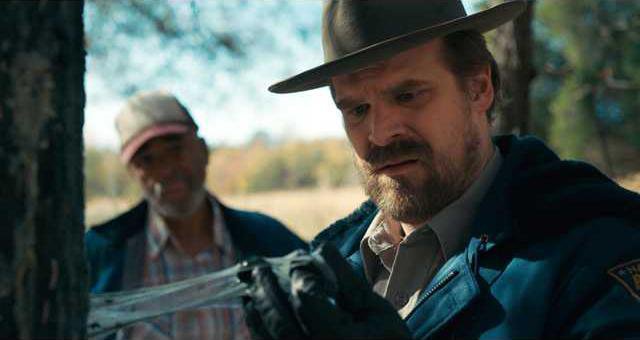Anyone watching Stranger Things 2 can expect more swearing and a darker tone.
The hit Netflix shows sequel season was released Friday, Oct. 27, with all nine episodes immediately available for binge-watching. So far, the shows already spawned memes, rave reviews and the discovery of cool easter eggs.
But the second season also features more cursing than the first, although both are rated TV-14.
So why the increase in language? The show's founder, Ross Duffer, acknowledged that the young characters are "much more foulmouthed in season two than in season one," according to an interview with WIRED. Co-creator Matt Duffer explained that the child actors actually pushed for more swearing.
But in real life its far worse," Ross Duffer told WIRED. "Im like, I cannot believe that came out of your mouth."
He added that "when Netflix saw the first two episodes, they realized this is fine, its not going to turn off families."
But according to Pop Sugars Alessia Santoro. the increased swearing is an issue parents and teens need to consider before watching.
"Although most of this can be attributed to the mouths of Dustin ... and Steve ..., several characters take to swearing to articulate their feelings this season," Santoro writes.
The show also includes sexual innuendos, an increased amount of blood and gore, and party scenes that include smoking and underage drinking.
Although 'Stranger Things' is rated TV-14, upon binge-watching season two I think I'd personally give season one a PG-13 rating and the second season closer to an R rating, simply because the Duffer brothers turned everything from violence to swearing up a few notches in the show's latest nine episodes, Santoro wrote.
Reviewers at The Guardian also questioned whether the second season was too dark" as the characters are reeling from PTSD."
But The Atlantics Sophie Gilbert wrote that focusing on the after-effects of physical and emotional trauma is a highlight of the shows second season.
"One of the most maddening tropes within disaster movies is how characters whove endured extreme trauma tend to instantly recover as soon as theyre rescued," Gilbert wrote. "'Stranger Things 2,' though, is inflected from the start with the sense that, even a year later, its characters are still deeply altered by what happened to them."
In fact, the shows monster called the Shadow Monster might be a metaphor for the characters' traumatic struggles.
The darkness, it explains, is always there, in this dimension and in others," Gilbert wrote. "But it also presents a more honest path to surviving it not an instant fix, but a slow, difficult path toward recovery.
The hit Netflix shows sequel season was released Friday, Oct. 27, with all nine episodes immediately available for binge-watching. So far, the shows already spawned memes, rave reviews and the discovery of cool easter eggs.
But the second season also features more cursing than the first, although both are rated TV-14.
So why the increase in language? The show's founder, Ross Duffer, acknowledged that the young characters are "much more foulmouthed in season two than in season one," according to an interview with WIRED. Co-creator Matt Duffer explained that the child actors actually pushed for more swearing.
But in real life its far worse," Ross Duffer told WIRED. "Im like, I cannot believe that came out of your mouth."
He added that "when Netflix saw the first two episodes, they realized this is fine, its not going to turn off families."
But according to Pop Sugars Alessia Santoro. the increased swearing is an issue parents and teens need to consider before watching.
"Although most of this can be attributed to the mouths of Dustin ... and Steve ..., several characters take to swearing to articulate their feelings this season," Santoro writes.
The show also includes sexual innuendos, an increased amount of blood and gore, and party scenes that include smoking and underage drinking.
Although 'Stranger Things' is rated TV-14, upon binge-watching season two I think I'd personally give season one a PG-13 rating and the second season closer to an R rating, simply because the Duffer brothers turned everything from violence to swearing up a few notches in the show's latest nine episodes, Santoro wrote.
Reviewers at The Guardian also questioned whether the second season was too dark" as the characters are reeling from PTSD."
But The Atlantics Sophie Gilbert wrote that focusing on the after-effects of physical and emotional trauma is a highlight of the shows second season.
"One of the most maddening tropes within disaster movies is how characters whove endured extreme trauma tend to instantly recover as soon as theyre rescued," Gilbert wrote. "'Stranger Things 2,' though, is inflected from the start with the sense that, even a year later, its characters are still deeply altered by what happened to them."
In fact, the shows monster called the Shadow Monster might be a metaphor for the characters' traumatic struggles.
The darkness, it explains, is always there, in this dimension and in others," Gilbert wrote. "But it also presents a more honest path to surviving it not an instant fix, but a slow, difficult path toward recovery.








